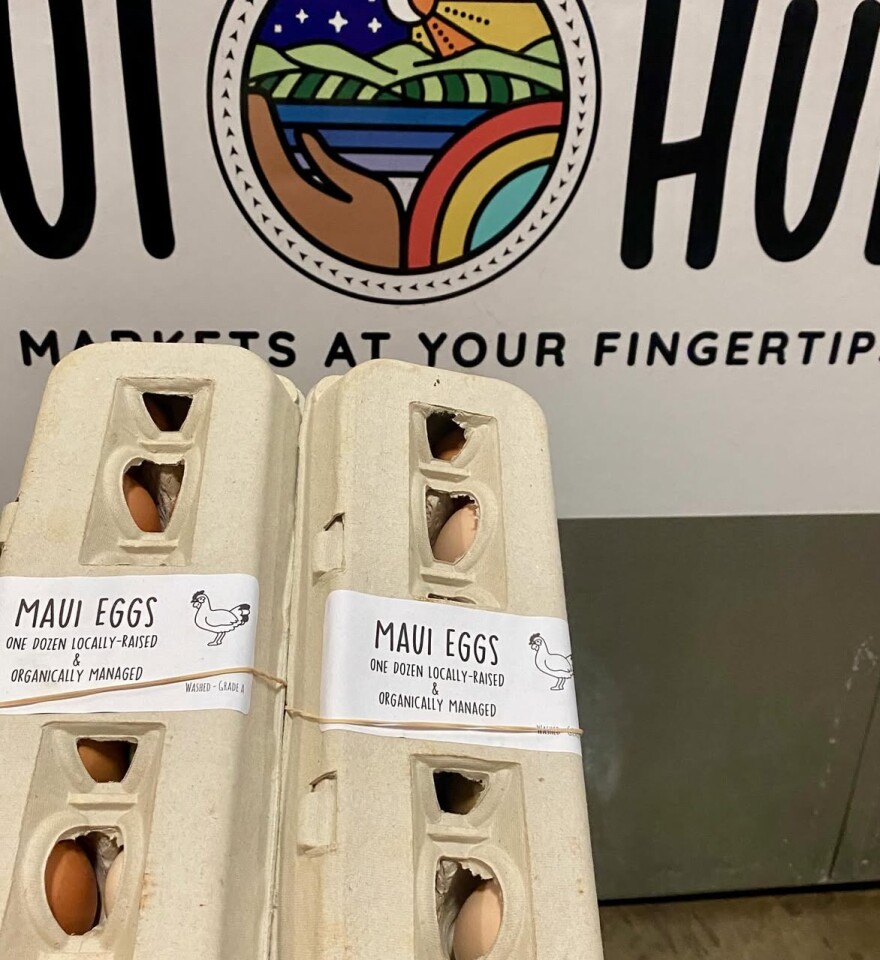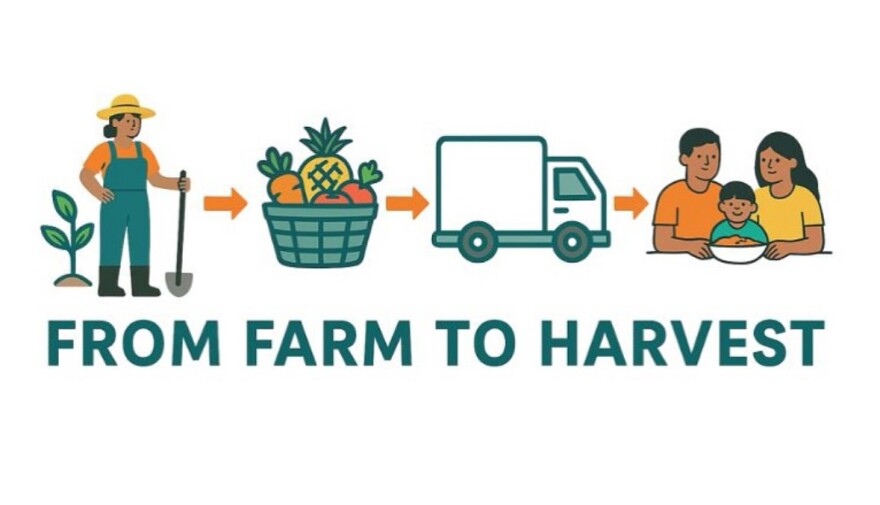Residents across Hawaiʻi are bracing for impacts to the federal SNAP benefits that many rely on to feed their families.
But SNAP also helps local farmers, said Evan Ryan, owner of Pono Grown Farm in Upcountry Maui.
“It supports people getting access to more nutritious food, but also locally produced foods,” he explained. “For us here in Hawaiʻi, that's kind of like the primary way that SNAP supports us, is it gives people direct access to locally grown foods that we're producing.”

Two federal judges have ordered the Trump administration to use emergency funding to provide SNAP benefits for the 42 million people nationwide who rely on the program, NPR reports. But it was unclear hours after the rulings Friday how much assistance may be provided or when it might come.
In Hawaiʻi, the 160,000 or so SNAP recipients are preparing not to see new funds for November come Saturday.
Pono Grown Farm produces a diverse variety of vegetables, fruit and honey on about 13 acres in Makawao, using regenerative and organic methods, with a focus on youth and community agricultural education.
Ryan sells their produce at an upcountry farmer’s market, through the Maui Hub, and at a local grocery store — all of which accept SNAP.
Maui Hub connects residents with farmers to directly distribute produce through an online marketplace. It was founded during COVID and assisted with feeding the community and supporting affected farmers after the 2023 wildfires.
Co-founder Autumn Ness said the organization has grown steadily. But now, that’s changed.
“It's become this like reliable local food infrastructure,” she said. “What we're seeing right now is in July of this year, is the first time since our birth, where we have done less sales than the previous year in that month.”
Ness said that’s when changes to SNAP benefits were announced as part of President Trump’s Big Beautiful Bill.
“One of our points of pride is that about 40% of our sales are to SNAP customers. That is a benchmark for us. We wanted to make sure that we're not just creating a market for local food, but we're creating a market for local food that gets local food to local people's tables.”

She said Maui Hub's overall sales are down about 20% from this time last year. Weekly orders average around 300, Ness said.
“We do an average of 60 to 70 SNAP households every week and we only did 47 SNAP household sales this week. That's before the thing shows up where your card doesn't get reloaded with benefits,” she said. “So we're feeling on our end that people are starting to conserve and just prepping for when they're not going to get a re-up of their benefits.”
And that has broader implications.
“That means people are buying less food. It means farmers are selling less food, right? So they're seeing less revenue, less sales mean that our staff work less hours,” Ness said.
“One of the big metrics for success for Maui Hub since the beginning was that we create jobs that are not dependent on the visitor industry, you know, economic diversification. And right now, our staff are getting fewer hours.”
More than 130 local farmers and producers sell through the Hub.
“I worry that folks are going hungry, and I worry that a 20% dip in sales every week for our farmers and ranchers is also a big deal, and we haven't even seen the brunt of this problem,” Ness said.
Ryan is concerned that with already tight profit margins among many farmers, SNAP cuts may push some to close.
“Moments like this come, or moments like COVID shutdown happens, or the Maui wildfires happened — all moments that farmers take a pretty significant hit,” Ryan said.
“Those are also moments that the community looks towards farmers to provide food for people in need, and farmers — we grow food for our community. We're eager to help. We're eager to support those challenging times. We have crops in the field that we're rolling out for sales that no longer is being sold, so we have that available to give away as well. But ultimately, you know, the question is, is like, how long can a farmer hold on without, without being profitable, and continue to be an operation?”
Community response on Molokaʻi
On Molokaʻi, the counterpart of Maui Hub, the Mobile Market Food Hub operated by nonprofit Sustʻāinable Molokai, also offers SNAP sales for residents to purchase locally grown food, but it’s not as large a percentage as on Maui.
Molokaʻi food hub manager Mercy Ritte said the market averages 70 to 80 customers per week, and about 15 to 20 of those use SNAP.
Ritte said that with Molokaʻi’s longstanding subsistence lifestyle for many families, she’s seen messages of support on social media for those affected by SNAP cuts.
“There's a lot of positive words of, ‘It's not a time to be in fear, because we can help each other out,’” she said, adding the island already has about 20 food pantries set up. Free produce distributions happen regularly within the community, and those who have extra, often share.
Ritte has also helped spearhead a no-cash produce trade event that’s been taking place for about a year.
“It's a gathering of community growers, farmers, backyard farmers, and gardeners who have an abundance in their yard,” she said. “It's just a place that we meet at the library once a month, and we just bring all of our abundance to share freely, with no expectation of receiving something — no cash exchange. We have a lot of this kind of bartering, trade system between neighbors.”

For Ness, the impacts of programs like SNAP are far-reaching.
“It's easy for people just to think about only the people who are impacted, like, directly, folks who are hungry, and that's really important,” she said, “I don't think they realize how much of our economy rests on programs like this.”
The Maui Hub encourages residents to increase their support of local farmers if they’re able to. For community members in need, local food pantries are ramping up efforts to help.
Local food banks and further resources:
- Maui, Molokaʻi and Lānaʻi: Maui Food Bank
- Oʻahu and Kauaʻi: Hawaiʻi Foodbank
- Hawaiʻi Island: The Food Basket
- Hawaiʻi SNAP Outreach Providers
- Aloha United Way 2-1-1
Hawaiʻi Public Radio exists to serve all of Hawai’i, and it’s the people of Hawai’i who keep us independent and strong. Help keep us strong to serve you in the future. Donate today.
Do you rely on SNAP? What are your concerns about the suspension of SNAP benefits due to the federal government shutdown? Share your questions and stories with Hawaiʻi Public Radio by leaving a voicemail at our Talkback Line 808-792-8217 or emailing us at talkback@hawaiipublicradio.org.





